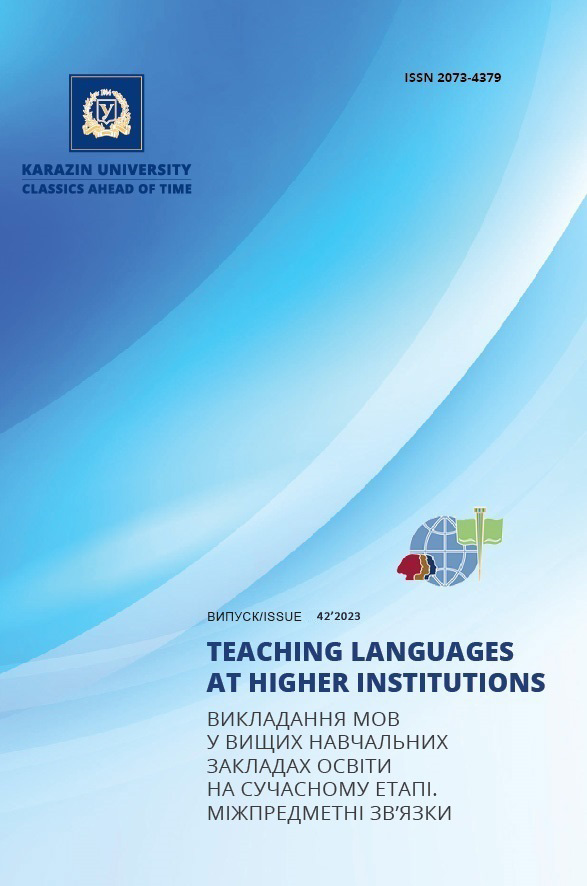Impact of virtual learning environment on the level of communicative competence formation
Abstract
The paper deals with the issue of replacing the traditional educational environment with a virtual one. The use of a virtual learning environment has different effects on the level of competence in foreign language communication. The purpose of the article is to substantiate the effectiveness of applying a virtual learning environment to the educational process of educational institutions and to describe the degree of its impact on the level of competence in foreign language communication. The authors conducted their research and experimental work on the basis of the Department of Philology, Translation, and Strategic Communications of the National Academy of the National Guard of Ukraine to identify the degree of influence of the use of virtual educational environments on the level of competence in foreign language communication.
They developed the “Model of formation of a foreign language job communicative competence” based on the fact that the appropriate level of competence in a foreign language professional communication means the ability to obtain a necessary information from foreign sources (while reading and listening) and to formulate oneʼs thoughts by making oral and written messages in the target language (while speaking and writing) while following the grammatical rules of the target language, using the necessary fund of relevant lexical units (at the level that would indicate the creation of linguistic competence) in a coherent and logical form (at the level that would testify to the formation of discourse competence), using appropriate verbal and non-verbal communication strategies (at the level that would testify to the formation of strategic competence) and following the customs, rules, beliefs and principles of a certain society of the target language native speakers (at the level that would testify to the formation of sociocultural competence).
The article presents the results of the pedagogical experiment on the formation of foreign language job communication competence based on three criteria (cognitive, motivational-value, and control-evaluative).
Downloads
References
Virtual learning environment “Lviv Polytechnic National University”. Available at: http://vns.lpnu.ua/login/index.php [Accessed 1 March 2023] [in Ukrainian].
Viakhk, I.A. (2013). Pedagogical conditions for the formation of foreign language communicative competence of future specialists in the field of information technologies. Extended abstract of candidateʼs thesis. Vinnytsia Mykhailo Kotsiubynskyi State Pedagogical University, Vinnytsia [in Ukrainian].
Havrylenko, K. (2020). Orhanizatsiini etapy stvorennia dystantsiinoho kursu. Ekstrene dystantsiine navchannia v Ukraini [Organizational stages of creating a distance course. Emergency distance learning in Ukraine]. Kharkiv: Miska drukarnia [in Ukrainian].
Galetskyi, S.M. The formation of communicative competence of future foreign language teachers by the means of information and communication technologies. Extended abstract of candidateʼs thesis. Zhytomyr Ivan Franko State University. Zhytomyr [in Ukrainian].
Krykun, V.D. (2018). Formation of Foreign Language Professional Competence of Future Military Management Masters. Extended abstract of candidateʼs thesis. Vinnytsia Mykhailo Kotsiubynskyi State Pedagogical University. Vinnytsia [in Ukrainian].
Liutyi, V.M. (2020). Theoretical Justification of the Meaning and Specifications of the Linguistic Competence in NGU Officers. Bulletin of Luhansk Taras Shevchenko National University. Pedagogical Sciences. 5 (336), pp. 35–50. DOI: https://doi.org/10.12958/2227-2844-2020-5(336)-35-50 [in Ukrainian].
Liutyi, V., Revutska, S. (2021). Improvement of the mechanism of implementation of virtual educational environments in the educational process of military educational institutions. Materials of the IV international scientific and practical conference “Problems of implementing distance learning in the educational process of higher military educational institutions and possible ways to solve them”. Ivan Chernyakhovsky National Defense University of Ukraine. Kyiv, pp. 61–63 [in Ukrainian].
Liutyi, V., Revutska, S., Bohdanova, O. (2023). Identification of the dependence of the level of formation of foreign language communication competence of students of higher education of the National Academy of the National Guard of Ukraine on the use of virtual learning environments and elements of distance learning in the educational process. Kharkiv [in Ukrainian].
Nazari, S., Komsomolenko, O., Shaihirdanova, A., Kozlova, O. (2021). Virtual Learning Environments: A Review and Future Directions. International Journal of Emerging Technologies in Learning (iJET). 16 (2), pp. 5–20. DOI: https://doi.org/10.3991/ijet.v16i02.12246.
Ovcharuk, O.V. (2018). Digital competence framework for citizens: a European strategy for determining the level of competence in the field of digital technologies. Bulletin of the National Academy of Pedagogical Sciences of Ukraine. Pedagogy and psychology. 1 (98), pp. 31–38 [in Ukrainian].
Stadnii, A.P. (2020). Models of distance education. Humanities science current issues: Interuniversity collection of Drohobych Ivan Franko State Pedagogical University. Young Scientists Research Papers. Vol. 4, 29, pp. 151–156 [in Ukrainian].
Khoroshevska, I.O. The structure of virtual learning environment for supporting student-centered training in publishing and printing specialty. Information Technologies and Learning Tools. 78 (4), pp. 203–218. DOI: https://doi.org/10.33407/itlt.v78i4.2885 [in Ukrainian].
Alves Paulo, Miranda Luísa, Morais Carlos. (2017). The Influence of Virtual Learning Environments in Studentsʼ Performance. Universal Journal of Educational Research. Vol. 5, no 3, pp. 517–527.
British Сouncil. Available at: https://learnenglish.britishcouncil.org [Accessed 1 March 2023].
Cambridge English. Available at: https://www.cambridgeenglish.org/countries/ukraine/ [Accessed 1 March 2023].
Canada.ca. Available at: https://www.canada.ca/en/department-national-defence/services/benefits-military/education-training/professional-develop ment/second-language-training.html [Accessed 1 March 2023].
Canale, M., Swain, M. (1980). Theoretical bases of communicative approaches to second language teaching and testing. Applied Linguistics. 1 (1), pp. 1–47.
Chris A. Boulton, Carmel Kent, Hywel T.P. Williams. (2018). Virtual learning environment engagement and learning outcomes at a ʼbricks-and-mortarʼ university. Computers & Education. Vol. 126, pp. 129–142. DOI: https://doi.org/10.1016/j.compedu.2018.06.031.
Distancelearning.anglia.ac.uk. Available at: https://distancelearning.anglia.ac.uk/british-army/ [Accessed 1 March 2023].
English Language Teaching. Available at: https://elt.oup.com/?cc=ua&selLanguage=uk [Accessed 1 March 2023].
Jadl.act.nato.int. Available at: https://jadl.act.nato.int/CourseCatalog.pdf.
Pearson Ukraine. Available at: https://www.pearson.eu/cee/ukraine/homepage/ [Accessed 1 March 2023].
Theocharous, M. (2017). Virtual Learning Environments: Using, Choosing and Developing your VLE. CreateSpace Independent Publishing Platform. Routledge.

